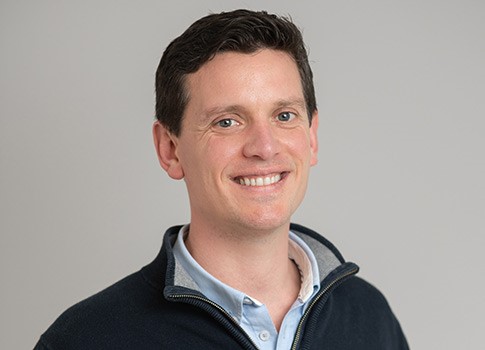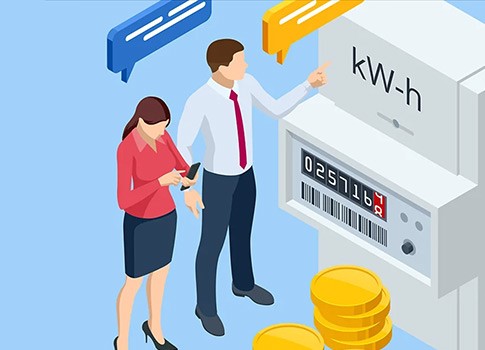A LIGHT-BULB MOMENT...
Energy costs now account for 11.4% of hospitality business turnover in the UK, with a £12 Billion annual rise in billing making grim reading at the beginning of April.
Taking steps to reduce your energy consumption can of course have a significant effect on the bottom line, not to mention the environmental impact.
To that end, we caught up with Jamie Greig, Founder of Our Property Bear, an energy saving system for hospitality businesses, to get some valuable tips on how to better monitor and reduce your energy usage.

Please introduce yourself and Our Property Bear
Sure. So my background is actually design engineering and project management. I used to work on optimising ship design, using theoretical models combined with data to test how equipment would act in the environment. The sea is a very volatile place! That's where I developed a passion for taking problems, gathering data, testing and finding real-world solutions and savings.
Then I moved into property development and operations, specifically for hospitality, renovating quite a few different buildings. I've always loved trying to do my bit for the planet and I really wanted to be part of the solution rather than the problem, which is quite hard in hospitality as there can be a lot of waste. We were investing in new energy systems for a property, but it was super frustrating not to have any feedback loop of how energy efficient any of them actually were.
That's really where I thought 'we need to do something' to get the data from these buildings to help justify investment, remove the guesswork and see the results. Lockdown gave us the time and opportunity to research how we might gather that usage data. The utility companies weren't much help, although they are getting better. It was either a very manual affair or we just couldn't get any data from them at all.
That's when we took it upon ourselves to create Our Property Bear and design a Smart Energy System using sub-metered energy data and hospitality specific KPI's to bring real perspective to energy usage.
Monitoring energy usage in a busy hotel can seem like a daunting task, how can hoteliers get started?
One of the most daunting aspects of your energy use is not knowing where all the gas and electricity is being used each month or where to find energy savings. Once you have the data and easy to use software, you can identify the priorities.
We started off measuring energy usage per floor. This was nice and easy as we could use the existing distribution boards, as well as the main equipment; boilers, coolers, extract, refrigeration, kitchen areas etc. It helped us see where the usage levels were so that we could target an area or a piece of tech and understand the effect any changes were having upon energy usage.
For hoteliers, I would say start with your meters. Find out what they're serving, which areas of the hotel, what equipment and crucially, look into whether you can get any historical usage data from your providers. That's absolutely key so that you can begin to benchmark your energy usage and measure the impact of any efforts to reduce consumption. Of course, the best analysis is year-on-year as the seasonality of hospitality and external factors like the outside temperature means month-on-month or period-on-period analysis is challenging.
Then it's about setting some KPI's around your usage. We recommend basing this on occupancy (or restaurant covers) so that you can assess the energy consumed per guest; Kilowatt hours per guest. This helps you to account for busier periods when you will of course use more energy.
PRACTICALLY SPEAKING, HOW CAN HOTELIERS REDUCE THEIR ENERGY USAGE?
It probably sounds obvious, but a good starting point is to try turning things off at night and making sure your close down and start up procedures are well-defined for your team. It's not necessarily going to affect the experience of the majority of your guests who will likely be asleep.
Also, another obvious point, but one that's commonly overlooked... any rooms that aren't being used, turn off the lights, turn down the heating, make sure there's nothing left switched on. Of course there's balance to be had here. Nobody wants a bad TripAdvisor review from someone complaining about being cold - but for those areas of the hotel that aren't being used during certain times - there can be a significant energy saving. Extract can be another huge energy user. If you have a variable speed drive, try turning it down. Or simply try turning it down or off at night, when it's not in use.
A lot of your Kilowatt hours, whether it's gas or electricity, are going to be used on heating so just make sure your controls and settings are all correct. Rather than it becoming really hot and your team opening all the windows and watching money fly out, invest time in setting your heating correctly for the seasons.
Some of the sites we're monitoring, more than 50% of their energy use is on hot water, just people having showers! Of course with Legionnaires you have to keep temperatures above certain thresholds, but you can check that your boilers are configured correctly, temperatures are being monitored and that any flow restrictors are setup correctly too.
For some of the restaurants we monitor, their biggest consumer of energy is their ice machines. Simply turning one of these off, or your fridges or freezers, during quieter spells can make quite a big impact.
Don't forget the back of house as well. Often a lot of focus is placed on reducing energy usage in guest facing areas, but why stop at putting LEDs in your restaurant for example? Why not put them in back of house areas too - the savings can be significant. We had one example where a back of house corridor with old lightbulbs was using the same lighting energy as the entire restaurant!
The final point is simply good maintenance. Make sure your technology and systems are cleaned regularly - if they become dirty and inefficient you can quickly save 15% by just cleaning and maintaining them more regularly.

How can hoteliers involve the whole team in reducing energy?
Well, we find that CFO's contact us because they know that their energy bills have doubled, tripled, quadrupled. They know they have a problem, but they don't know what the solution is. Quite often they've spent some amount of time and effort telling their Managers and staff 'you need to start turning things off, you need to start saving energy and be more efficient' but they have no way of keeping track of things. All they see is this painful monthly bill.
For the Managers and staff, they don't really know whether what they're trying is working or not, whether they're focusing on the right areas. The Manager may well have told the Head Chef to switch things off at the end of the day, but is the Head Chef actually remembering to do it after a busy shift?
It really comes down to the reporting. It allows owners and CFO's to see where they need to spend their resources, be that money, training, equipment etc. It means they and their team can prioritise the biggest impact areas. They can even set up alerts to notify the team when things are left switched on, so that good habits can begin to form.
It was key for us to make that reporting accessible and straightforward. Since the pandemic there's obviously been an influx of new people to the industry, each with busy workloads, so unless the data was simple to understand it would have been very challenging to get everyone pulling in the same direction.
What benefits does having a greater understanding of your energy usage bring?
All the practical advice is useless, unless you have the data to see the results. Otherwise, you might be performing well in some areas and not in others. It is very easy for people to fall back into old habits.
I think one of the biggest benefits is having everyone on board; owners, management, team members. Even the finance team are able to demonstrate how significant energy is to the P&L. This brings a collective understanding for everyone that, in order to cover our energy bill we're going to need to sell a lot of rooms and covers this month.
The ongoing learning is really valuable too. Knowing what is and isn't working well, what pieces of equipment are costing a fortune etc. When you get your next site, you can use that data and knowledge to design, plan and set things up to be much more efficient.
Then, of course, there's the financial savings and environmental impact. One of our clients has managed to reduce their energy usage by 30%!
What’s one thing that hoteliers could/should be doing today to begin to better understand their energy usage?
Speak to your providers to find out if you can get historic energy usage data. Even if you set up all the monitoring tomorrow, without historical data you effectively have to wait a year before you have a benchmark figure. Once you have that data you can begin to measure year-on-year performance and set some objectives on reducing your energy usage.
I would also recommend that you address your big consumers first. You could spend your time telling the team to turn off monitors at night, to switch off lighting, but unless you monitor, understand and target some of the biggest consumers of energy within your business you'll never move the needle significantly. That's where you'll see a more immediate drop.
Anyone that isn’t monitoring their energy use should really start now.
Monitor your hotel's energy usage
Better Information. Better Decisions. Lower Energy Bills.
Get in touch with Jamie if you're interested in finding out more about monitoring (and reducing) your hotel's energy usage.
li: Jamie Greig / Our Property Bear







